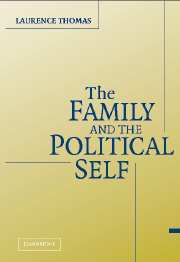Chapter 4 - From Family to E Pluribus Unum
Published online by Cambridge University Press: 05 June 2012
Summary
In Rousseau's Social Contract, we find one the most moving passages in the social contract tradition ever written. It reads as follows:
Whatever advantages man is deprived of in the State of Nature, he fully regains in Civil Society. His faculties are engaged and fully developed, his ideas are broadened, and his sentiments are ennobled. Indeed, his very soul is entirely elevated.
Man should continuously bless that wonderful moment when he was uprooted forever from the state of being a stupid and limited animal in the State of Nature, and made an intelligent being and a man in Civil Society.
Philosophical writing does not wax more rhapsodic than this. If these remarks describe what Civil Society affords each and every one of its members, nothing could be more rational for a person than to want to be a member of Civil Society. Yet, a note of caution must be sounded. For although this passage certainly implies that every member of society is better off, the idea does not seem to be that this is because society is the best conduit for the maximization of the self-interests of each person insofar as humans beings must live together. More precisely, the idea does not seem to be that Civil Society is preferable because it affords individuals in abundance whatever it is that they might have very much wanted to have in the State of Nature.
- Type
- Chapter
- Information
- The Family and the Political Self , pp. 130 - 170Publisher: Cambridge University PressPrint publication year: 2006

